A warrant is a written order from a judge that permits law enforcement to take a specific action. Read below to learn more about the types of warrants in Texas.

What are the Types of Warrants in Texas?
There are four main types of warrants in Texas.
- Arrest Warrants – Arrest warrants are court orders issued by a judge or magistrate that give law enforcement the legal power to arrest an individual suspected of a crime. The judge will only issue an arrest warrant if the state establishes probable cause. Probable cause means that there are facts and circumstances that would lead a reasonable person to believe that the individual committed the crime.
For an arrest warrant to be valid in Texas, it must be signed by a judge, have the name or description of the alleged offender, and include the offense the individual is being accused of. Frisco law enforcement does not always need a warrant when making an arrest. If you have questions about warrantless arrests, contact attorney Philip D. Ray.
- Search Warrants – Search warrants are court orders that give law enforcement the legal right to search a person’s residence, place of work, vehicle, or personal belongings to obtain evidence of a crime. The Fourth Amendment of the US Constitution protects people from unreasonable search and seizure. Therefore, Texas courts will only issue search warrants if probable cause exists. The state must present the judge with affidavits and other evidence establishing that there is probable cause that a search will yield evidence related to a crime.
Under certain circumstances, police can conduct a search without a valid warrant. However, if a search is illegal and violates the alleged offender’s rights, any evidence found can be excluded from trial.
- Bench Warrants – Bench warrants are issued by a judge when an individual is in contempt of court. A person can be found in contempt for many reasons, including if they:
- Failed to appear in court for scheduled hearing,
- Disobeyed a subpoena to appear in court, or
- Failed to comply with a court order.
- Failed to appear in court for scheduled hearing,
When there is a bench warrant, law enforcement has the power to take the individual into custody and bring them before a judge.
- Blue Warrants – A blue warrant is a type of arrest warrant issued by the Texas Board of Pardons and Paroles. It is issued when a parolee is suspected of violating the terms of their parole. Parole violations range from missing a scheduled meeting with the parole officer to committing another criminal offense.
Experienced Frisco Criminal Defense Attorney Philip D. Ray
If you have questions about warrants, reach out to local Frisco criminal defense attorney Philip D. Ray. Call The Law Offices of Philip D. Ray today at (469) 588-6770 for a consultation.
